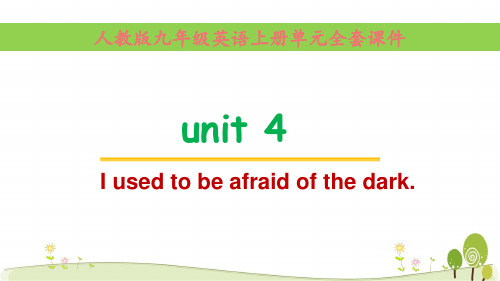人教版英语九年级上册课件全套(上)
合集下载
人教版英语九年级上册Unit4 Section A(1a-2d)课件

He/ She is…
quiet outgoing
funny
1a
Fill in the chart with words to describe people.
Appearance tall straight hair beautiful thin Personality outgoing funny quiet serious / strict
He was short in the past.
Now,he is tall.
He used to be short, but now he is strong.
He had straight hair in the past.
Now,he has curly hair.
He used to have straight hair, but now he has curly hair.
fat
strong short curly hair
kind
hard-working strange friendly
He wore glasses.
Now,he doesn’t wear glasses.
He used to wear glasses, but now he doesn’t wear glasses.
2d
Role-play the conversation.
Alfred: This party is such a great idea! Gina: I agree. It’s been three years since we last saw our primary school classmates. Alfred: It’s interesting to see how people have changed. Gina: Billy has changed so much! He used to be so shy and quiet. Alfred: Yeah, his face always turned red when he talked to girls! Gina: I used to see him reading in the library every day. Alfred: That’s because he was a really good student. He studied hard and got good scores on his exams. Gina: Did he use to wear glasses? Alfred: Yes, and he used to be thin, too. But look how big and strong he is now! Gina: He’s so popular now. Look at all the girls around him!
人教版英语九年级上unit4单元全套优质课件

Listen again and complete the exercise.
Conversation 1 Bob is here with his __p_a_r_e_n_t_s____ and he hasn't seen Mario for __fo_u__r___ years.
Conversation 2 Amy used to be really tall because Bob was ___s_h_o_r_t __ in the past.
3. If you're happy, you can find your changes.
Look at the pictures and describe the people.
What does he/she look like?
short/ brown hair 短/棕色头发
long /black hair 长/黑头发
1. Mario used to be__sh_o_r_t_ . He used to wear_g_l_a_ss_e_s_.
2. Amy used to be__t_a_ll____. She used to have __sh_o_r_t__hair.
3. Tina used to haver_e_d___ andc_u_r_ly___ hair.
➢Make sentences
He/She used to be/have/wear…, but now he/she is/has/wears ….
short/tall
young/old
heavy/thin
➢ change in personality
V S
人教版九年级上学期英语课件: Unit6(32张)

九年级上册Unit 6
过去十年里我的家乡发生了巨大的变化。 (2)happen “发生;碰巧”,一般用于偶然或突发性事 件。如: I happened to see him on my way home. =It happened that I saw him on my way home. 在回家 的路上我碰巧看到了他。 注意:happen 与 take place 通常都没有被动语态。
九年级上册Unit 6
(2)discover v. “发现;找到”,表示过去就存在但不 为人知的事物。如: Columbus discovered America in 1492. 哥伦布在1492 年发现了美洲。 (3)create“创造”,指经过努力使事物从无到有。如: They created one new record after another. 他们创造 了一个又一个的新纪录。
1、人才教育不是灌输知识,而是将开发文化宝库的钥匙,尽我们知道的交给学生。 2、一个人的知识如果只限于学校学习到的那一些,这个人的知识必然是十分贫乏的10:03:1110:03:1110:0310/13/2021 10:03:11 AM 3、意志教育不是发扬个人盲目的意志,而是培养合于社会历史发展的意志。 4、智力教育就是要扩大人的求知范围 5、最有价值的知识是关于方法的知识。 6、我们要提出两条教育的诫律,一、“不要教过多的学科”;二、“凡是你所教的东西,要教得透彻”2021年10月上午10时3分21.10.1310:03October 13, 2021 7、能培养独创性和唤起对知识愉悦的,是教师的最高本领2021年10月13日星期三10时3分11秒10:03:1113 October 2021 8、先生不应该专教书,他的责任是教人做人;学生不应该专读书,他的责任是学习人生之道。上午10时3分11秒上午10时3分10:03:1121.10.13
九年级人教版英语上册课件:Unit 5 Section A 1a-2d(共36张PPT)

4. Where were they made? America.
5. Where did Susan buy the chopsticks? Korea.
6. How does Anita like the chopsticks? Cool.
7. What else does Susan show? Ring.
8. Where was the ring made? Thailand.
9. What will Susan do with the ring? She give it to her friend.
1c Practice the conversation in 1a. Then make conversations using the information in 1b.
Unit 5 What are the shirts made of?
Section A 1a-2d
Warming Up What are these things? Say the names in English.
chopsticks
bowl
What are these things? Say the names in English.
glass vase
gold medal
•1、使教育过程成为一种艺术的事业。 •2、教师之为教,不在全盘授予,而在相机诱导。2021/10/222021/10/222021/10/2210/22/2021 11:59:39 AM •3、一年之计,莫如树谷;十年之计,莫如树木;终身之计,莫如树人4、智力教育就是要扩大人的求知范围 •5、教育是一个逐步发现自己无知的过程。 •6、要经常培养开阔的胸襟,要经常培养知识上诚实的习惯,而且要经常学习向自己的思想负责任。2021年10月 2021/10/222021/10/222021/10/2210/22/2021
5. Where did Susan buy the chopsticks? Korea.
6. How does Anita like the chopsticks? Cool.
7. What else does Susan show? Ring.
8. Where was the ring made? Thailand.
9. What will Susan do with the ring? She give it to her friend.
1c Practice the conversation in 1a. Then make conversations using the information in 1b.
Unit 5 What are the shirts made of?
Section A 1a-2d
Warming Up What are these things? Say the names in English.
chopsticks
bowl
What are these things? Say the names in English.
glass vase
gold medal
•1、使教育过程成为一种艺术的事业。 •2、教师之为教,不在全盘授予,而在相机诱导。2021/10/222021/10/222021/10/2210/22/2021 11:59:39 AM •3、一年之计,莫如树谷;十年之计,莫如树木;终身之计,莫如树人4、智力教育就是要扩大人的求知范围 •5、教育是一个逐步发现自己无知的过程。 •6、要经常培养开阔的胸襟,要经常培养知识上诚实的习惯,而且要经常学习向自己的思想负责任。2021年10月 2021/10/222021/10/222021/10/2210/22/2021
人教版九年级上学期英语课件: Unit2(共35张PPT)

九年级上册Unit 2
例题跟踪演练 (B ) 4. (2017内蒙古呼和浩特) There are fifty students in Class One. Twenty of them are boys, __________ are girls. A. the other B. the others C. others D. anther 解析:本题考查代词。根据句意可知twenty boys是fifty students里面的一部分,而横线处 表示特定的另一部分且横线处作为are的主语。
九年级上册Unit 2
A rooster lying on the ground lied that he laid an egg yesterday. 一个躺在地上的公鸡撒谎说他昨天下了一颗 蛋。 He lay on the floor, reading a book. 他躺在地板上看书。 The small town lies among the mountains. 小镇位于群 山之中。 I’m sorry I lied to you. 我很抱歉向你撒了谎。 He laid the book on the table. 他把书放在了桌子上。
九年级上册Unit 2
例题跟踪演练 ( A ) 3. When she came back a few days later, she found that all things still ______ where she had ______ them. y; laid id; laid y; lain D.lying; lain 解析:本题考查辨析易混词。根据句意可知第一个横线 处动词的主语是all things, 所以动词表达的是位于;第 二个横线处动词的主语是she,所以动词表达的是放置。 且整个句子是用的是过去时态。
人教版九年级上学期英语课件: Unit3(共23张PPT)

九年级上册——英语 听课手册
九年级上册Unit 3
Section A 高频考点精讲 1.The bookstore is on your right, beside the bank. 书店 在你的右边,银行旁边。 (1)辨析beside, besides与except beside prep “在……旁边”。如: You can sit beside me. 你可以坐我旁边。
九年级上册Unit 3
besides “除……之外(包含在内)”。如: There are another three students besides me. 除 我之外还有其他的三个学生。 except prep. “除了……之外(不包括在内)”。 如: I like all kinds of fruit except apples. 除了苹果,所 有的水果我都喜欢。 (2)辨析by, beside, near, next to与close to 上。
九年级上册Unit 3
①by和beside均表示“在……旁边”,常可互换。 如: Come and sit beside/by me. 过来,坐在我边 ②near表示“在……附近”,表示的距离比by和 beside稍远些。如: Don’t play near the road. 不要在马路附近玩耍。 There is a post office near the bank. 银行附近有一 所邮局。
解析:本题考查现在完成时态。从句中for almost 3 years 可知,横线处的谓语动词需要用延续性动词或表 某种状态存在的词,且时态采用现在完成时。
九年级上册Unit 3
3.You don’t need to rush! 不用急! need的用法 need后加to do 说明need为实义动词,用助动词提问 或否定;need后加doing表被动意义;若need后加 do,则need为情态动词,用need提问,肯定回答用 must,否定回答用needn’t。如:
九年级上册Unit 3
Section A 高频考点精讲 1.The bookstore is on your right, beside the bank. 书店 在你的右边,银行旁边。 (1)辨析beside, besides与except beside prep “在……旁边”。如: You can sit beside me. 你可以坐我旁边。
九年级上册Unit 3
besides “除……之外(包含在内)”。如: There are another three students besides me. 除 我之外还有其他的三个学生。 except prep. “除了……之外(不包括在内)”。 如: I like all kinds of fruit except apples. 除了苹果,所 有的水果我都喜欢。 (2)辨析by, beside, near, next to与close to 上。
九年级上册Unit 3
①by和beside均表示“在……旁边”,常可互换。 如: Come and sit beside/by me. 过来,坐在我边 ②near表示“在……附近”,表示的距离比by和 beside稍远些。如: Don’t play near the road. 不要在马路附近玩耍。 There is a post office near the bank. 银行附近有一 所邮局。
解析:本题考查现在完成时态。从句中for almost 3 years 可知,横线处的谓语动词需要用延续性动词或表 某种状态存在的词,且时态采用现在完成时。
九年级上册Unit 3
3.You don’t need to rush! 不用急! need的用法 need后加to do 说明need为实义动词,用助动词提问 或否定;need后加doing表被动意义;若need后加 do,则need为情态动词,用need提问,肯定回答用 must,否定回答用needn’t。如:
人教版九年级英语上册Unit3SectionA1a-2d课件 (共64张PPT)

Sure ,you can _____in the_______.
Could you please tell me where I can…?
shoe store
get a pair of shoes
Sure ,you can _____in the_______.
Could you please tell me where I can…?
§自主学习案
翻译下列词组。 1.买一些邮票 _b_u_y__s_o_m_e__st_a_m_p_s__ 2. 得到关于…的信息g_e_t_s_o_m_e__in_f_o_r_m_a_t_io_n__a_b_o_u_t __ 3.打扰了 __ex_c_u_s_e_m__e_____ 4.向左/右转 _t_u_rn__le_f_t/_r_ig_h_t__ 5.经过书店 _g_o_p_a_s_t_t_h_e_b_o_o_k_s_to_r_e 6.在…和…之间 _b_e_t_w_e_e_n_…___a_n_d_…_ . 7.在左/右边 _o_n_t_h_e_l_e_ft_/r_i_g_h_t ___ 8.在那边 _o_v_e_r_th_e_r_e______ 9.在二楼 o_n__th_e__s_e_co_n_d__f_lo_o_r_ 10.买一双鞋 _g_e_t_a__p_a_ir_o_f_s_h_o_e_s_
Could you please ___B_____ us Mary's telephone number?A. Biblioteka o giveB. give
C. giving
D. to giving
Which sentence is right? 1. Could you please tell me where the restrooms are? 2. Could you please tell me where are the restrooms?
Could you please tell me where I can…?
shoe store
get a pair of shoes
Sure ,you can _____in the_______.
Could you please tell me where I can…?
§自主学习案
翻译下列词组。 1.买一些邮票 _b_u_y__s_o_m_e__st_a_m_p_s__ 2. 得到关于…的信息g_e_t_s_o_m_e__in_f_o_r_m_a_t_io_n__a_b_o_u_t __ 3.打扰了 __ex_c_u_s_e_m__e_____ 4.向左/右转 _t_u_rn__le_f_t/_r_ig_h_t__ 5.经过书店 _g_o_p_a_s_t_t_h_e_b_o_o_k_s_to_r_e 6.在…和…之间 _b_e_t_w_e_e_n_…___a_n_d_…_ . 7.在左/右边 _o_n_t_h_e_l_e_ft_/r_i_g_h_t ___ 8.在那边 _o_v_e_r_th_e_r_e______ 9.在二楼 o_n__th_e__s_e_co_n_d__f_lo_o_r_ 10.买一双鞋 _g_e_t_a__p_a_ir_o_f_s_h_o_e_s_
Could you please ___B_____ us Mary's telephone number?A. Biblioteka o giveB. give
C. giving
D. to giving
Which sentence is right? 1. Could you please tell me where the restrooms are? 2. Could you please tell me where are the restrooms?
人教版九年级上册英语课件:Unit 1 Section A(3a-4c) (共22张PPT)

• 5.【辨析】as well、also、too与either。四者都可意为“也,还”, 但用法有区别。(1)as well是副词短语,常用于口语中。它相当于too, 通常位于肯定句句末,多与and和but搭配使用。(2)also通常位于be 动词、助动词和情态动词之后,实义动词之前。(3)too比also更口语 化,常用于肯定句中,既可放在句中,也可放在句末。常用逗号与句 子其他成分隔开。(4)either用于否定句句末。
• _____W__h_a_t/_H_o_w__ ______a_b_o_ut__going fishing this weekend?
• 5.My brother is only five years old,but he can play the piano very Awlethlol.ugh/Though
• 4.Taking no_t_e_s_____ is a good way to learn English.
• 5.His favourite subject isph_y_s_i_cs_________(物理) and he is very
good at it.
grammar
• 6.I find it hard to learn English _____________(语法).
• ③use是动词,意为“使用”,在句中作谓语。
基础训练
• 一、根据句意及首字母或中文提示写出单词。
• 1.He revealed (泄露) thes_ec_r_e_t________ (秘密) by accident.
• 2.He _____d_is_c_o_v_e_re_d____ (发现) a beautiful island. • 3.【山东烟台中考】John is interested cihnem__is_tr_y___________(化学).
- 1、下载文档前请自行甄别文档内容的完整性,平台不提供额外的编辑、内容补充、找答案等附加服务。
- 2、"仅部分预览"的文档,不可在线预览部分如存在完整性等问题,可反馈申请退款(可完整预览的文档不适用该条件!)。
- 3、如文档侵犯您的权益,请联系客服反馈,我们会尽快为您处理(人工客服工作时间:9:00-18:30)。
1b Listen. How do these students study for a test? Write letters from 1a above.
__b___1. Meiping ___e__2. Peter __d___3. Tony
1c Make conversations about how you study for a test.
猴子用尾巴吊在树上。 (4) 用于被动句中,表示行为主体,常译 作“被”、“由”等。 ►English is spoken by many people. 许多人讲英语。
(5) 组成其它短语: by the way :意为“顺便说”、“顺便问一 下”,
常做插入语。 ► By the way, where’s Lily? 顺便问一下,李丽在哪儿? by oneself :意为“单独”、“自己”。 ► I can’t leave her by herself. 我不能把她单独留下。 by and by :意为“不久以后”、“不一会儿”。 ► By and by, more and more people began to study English.
➢ Warming-up
How do you study English? Do you study English by the following ways ?
I study English by working with friends.
I study English by making word cards.
(2) 意为“不迟于”、“到……时为止”。如:
►He will be all right by supper time. 他在晚饭前会好的。
(3) 表示方法、手段,可译作“靠”、“用” 、“凭借”、“乘坐”等。 ►The monkey was hanging from the tree by his tail.
reading and writing in English?
➢ Objectives
To learn to use verb + by … To learn how to learn English better. To learn new words: textbook, conversation, aloud, pronunciation …
A: How do you study for a test? B: I study by working with a group.
How do you study for a test?
I study by working with
a group.
How do you study for a test ?
By reading English stories.
By reading English newspaper.
By watching English movies.
By speaking with foreigners.
By making pal-friends with foreigners.
I study English by taking part in English Contest.
I study English by watching English movies.
1a Check (✔) the ways you study English. Then add other ways you some句,常用来提问by引导的方式状语。
by表示“通过……方法、手段”等。 by doing sth. 意为“通过……(方法、途径)做某事”
by是个很常用的介词(有时也用作副词),在初中英语 中的其他用法有以下几种:
(1) 意为“在……旁”、“靠近”。如: ► They are drawing by the lake. 他们在湖边画画。
I study English by asking the teacher for help.
I study English n. 课本 by reading the textbook.
I study English by working with a group.
I study English by listening to tapes.
I study by…
How do you study for a test? I study by…
listening to the radio
How do you study for a test? I study by…
Reading English texts
speaking English in class
人教版英语九年级上册课件全套(Unit 1-4)
Unit 1
How can we become good learners?
Section A 1a-1c
➢ Free talk
How do people learn a foreign language? Do you have good ways to learn English? How can you improve your speaking, listening,
_____a. by working with friends
__✔___b. by making word cards __✔___c. by reading the textbook __✔___d. by listening to tapes __✔___e. by asking the teacher for help
How do you study for a test? I study by…
keeping English diaries
Language points
—How do you study for a test? 你是怎样准备考试的?
—I study by working with a group. 我通过和小组成员合作学习。
